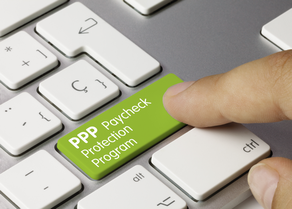In Pursuit of Profit
Read our expert article below or sign up to get articles sent to your inbox.
 So, you secured a Paycheck Protection Program (PPP) loan from the SBA, now what? Most businesses do not need help figuring out how to spend this money. However, when it comes to accounting for the loan, plenty of businessowners are confused about how to handle it correctly.
You asked, so we are providing a guide to help you navigate the waters. Follow this PPP bookkeeping how-to guide to keep your books clean after receiving your loan: Open a Separate Bank Account
Once you have received the loan, deposit funds into a separate PPP-dedicated bank account. This is the easiest way to avoid the blurring of funds with existing cash reserves. Keeping the money separate is an audit-friendly approach because it creates a clear money trail of how PPP loan funds are being used and facilitates correct revenue recognition. Unfortunately, many businessowners are skipping this step because of the hassle of opening a bank account these days and the fees associated with doing so. Right now, it may be more difficult than usual to open a new account because some banks are accepting clients by appointment only since their lobbies are closed and reducing the number of available appointments, but this is an important first step. Additionally, a new account may have account fees as well, which may be a turnoff to cash-strapped businesses. However, we still recommended that you open a new account to keep PPP money separate and just consider any new account fees part of the cost of receiving the loan. Create the Loan Account Once your physical bank account has been opened, create a bank account with the same name in your online accounting system as well to match and set up the lending bank as one of your vendors. Manually enter the funds received (or ensure that they have been automatically added correctly from the linked bank) with the deposit date and amount. Pay Expenses Write checks or transfer money between bank accounts electronically to get the money where it needs to go by paying expenses and then “paying back” your business with PPP funds. Expenses that qualify for forgiveness, as of this date, include payroll, rent, and other utilities. For example, pay an allowable expense for $95.25 from your business checking account and then make an accompanying transfer of $95.25 from your PPP bank account to your business checking account. Then make the appropriate bookkeeping entries in your online accounting system to accompany this activity. When paying expenses by check, use the memo line to stay organized so you do not have to try to figure out what each check was for later. Pay expenses as you incur them until the PPP funds have been exhausted. When multiple expenses are paid over the same time period, always transfer funds as separate transactions for better recordkeeping. If you must combine expenses, ensure that they are related and make sense to combine (ex. combining payroll wages and payroll taxes). If your PPP funds have already been used up, follow these best practices to improve cash flow: 20 Cash Flow Management Tips for Small Business Owners. Please note: This article is meant for informational purposes only and does not constitute legal or financial advice. Individual business circumstances will vary and may affect bookkeeping considerations as a result. Consult your accountant for specific information for your organization. |
SUBSCRIBE:DOWNLOAD:DOWNLOAD:Categories:
All
Archives:
July 2024
|
Services |
Company |
|
8/7/2020